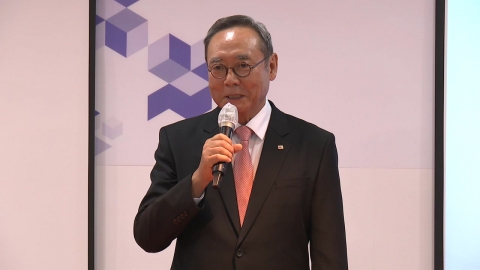■ Starring: Yang Wook, a researcher at Asan Institute for Policy Studies,
* The text below may differ from the actual broadcast content, so please check the broadcast for more accurate information. Please specify [YTN New Square 10AM] when quoting.
[Anchor]
President-elect Donald Trump, who has re-entered the White House, has begun a full-fledged transition of the regime. Attention is also focusing on how Trump's victory will affect the war in Ukraine, including the situation on the Korean Peninsula. Let's talk in detail with Yang Wook, a researcher at Asan Institute for Policy Studies.
[Yang Wook]
How are you?
[Anchor]
First of all, Trump has succeeded in entering the White House again. Now we've started the process of consolidating the 2nd Cabinet. However, when I saw the first chief of staff, Suzy Wiles, who was the co-chairman of the election committee, was appointed. He's called a master behind the scenes. What kind of person is he?
[Yang Wook]
It's made with ice. So he's a political consultant who's very cold-headed enough to be nicknamed the ice lady. He started politics as a member of the House of Representatives' staff in 1979 and has continued to serve as a consultant on the so-called presidential campaign and politics since the 1980 Reagan first presidential election. Both 2016 and 2020 have continued to intervene in Trump's presidential election. In particular, as the chairman of the election committee this time, Trump actually played a role in tightening the reins of Trump, and as you know, Trump is a very passionate person, right? I've been controlling those parts well from behind. He didn't like to go forward.For Trump, loyalty is at the heart of Trump's second term.
When I was the first chief of staff, I used people who I didn't know well and who I could respect from the perspective of American conservatives.Ma, so at that time, those who supported Trump called it the axis of torpedo and expressed it, but it didn't fit with them. And the security advisers who were always with Trump, especially the ones who were not getting along very well. McMaster and John Bolton. Because of these things, I would have had to eventually use someone who could be loyal to me, and in that context, I think Susie Wiles would have judged her to be the best person given that she has been very wise in coordinating various issues in the camp. And since then, many characters have been mentioned.Ma said Trump was the most likely candidate and president in the Republican Party, even though he lost once. I've been in this position for quite some time, so in fact, there are a lot of people who are loyal to Trump in terms of loyalty.
[Anchor]
I think I learned a lesson from the first cabinet. As you said, we are setting up a cabinet centered on loyalists. You know, someone who is considered the first contributor to Trump's election. Elon Musk Could Enter Cabinet And there are reports that he will take on major positions, but the cabinet title is that he is the chairman of the Government Efficiency Committee. This is going to be newly established, right?
[Yang Wook]
You can think of it as a kind of regulatory reform committee. One thing to understand is that Musk didn't help Trump because he wanted to play politics. From Musk's point of view, in fact, he didn't get much help doing business under the Democratic administration or under Biden. For example, China is the main market and they have to sell electric cars there, but it becomes difficult to export to China through various laws. If you shoot SpaceX and drop a rocket in the sea or something, the law regulates that you can't do that. As the business continues to encounter obstacles in this way, it suddenly turns to support Trump in that area. He provided a lot of ideas and then came out to the campaign site like that, contributing to attracting a lot of votes. In that sense, Musk eventually supported Trump for the purpose of growing his business, and if so, he will work in areas related to the regulatory revolution needed to grow his business, not to that extent, but to the extent that he is involved in U.S. politics overall.
[Anchor]
There are about 41 pledges that Trump said he would carry out on his first day in office. From the campaign to expelling illegal immigrants to pardoning rioters at the Capitol. Is it possible to do all of this?
[Yang Wook]
First of all, I can do what I can do with documents. We will also be able to meet policies and take the first step of action to a large extent, if not half of them. But that came out as a pledge, but there are also things I said other than pledges. Representatively, it's like this. After I take office, I will call Zelensky and Putin to stop the war. There is clearly a difference between what was said during the election process and what was taken seriously as an actual pledge because it was not just one or two things starting with this. In fact, I think the American people understood those parts and voted.
[Anchor]
Since you brought it up, I'll try it. I promised that if I were the president now, the war would be over in 24 hours. How is it possible?
[Yang Wook]
Like that. Ukraine's biggest fear is that after the Trump administration comes in, war aid to them will be stopped. From the perspective of the United States, that doesn't mean that we can stop saying no because we became Trump. However, there must be this part. In the end, most of the support starts in the form of money, but it can't pass unless the parliament approves it. But as you know now, the House and Senate themselves have all been transferred to the Republican Party. The House of Representatives is not 100% decided yet, but it is very high. After this situation, Trump will be able to adjust as he wants. So we could go with a way to reduce the amount from the beginning. If you want to find a justification that allows the United States to cut back, you can find enough. For example, there are suspicions that a significant portion of Ukraine's funding is not spent cleanly.
If the Republican Party takes the lead in the Senate, the House of Representatives, or the Foreign Affairs Committee, and it starts to become a problem, it may be surprisingly easy to turn off the enthusiasm for support. So through those approaches, in the end, if you don't pay, you can't go to war. If that's the case, Ukraine will also have no choice but to compromise.
[Anchor]
From Ukraine's point of view and Putin's point of view, he congratulated Trump by saying that he hopes to restore relations with the U.S. someday after Trump's election, and that the ball is over to the U.S., but how will the relationship between the two be formed?
[Yang Wook]
Many people say that Trump and Putin themselves have similar tendencies and have bromance. Trump was unexpectedly wary of that part when he watched the first period. Didn't you even say that it was the help of the Russian mafia or that Trump was elected with the help of the Russian intelligence department? Because of those things, we have taken an objective approach to the Russian part and have kept a distance. I don't think it's going to be that different this time, but I think there must be some kind of communication, at least in terms of stopping the war.
It's just something like this. From Russia's point of view, the war cannot be stopped. I think that if the war stops until we take back the Kursk region, then we have to negotiate something to eventually get it back, and that could tarnish this part of Putin's war that he's the guardian of Russia, that he's secured Russia's interests, so the close battle in the Kursk region will continue anyway.
[Anchor]
In fact, what we are curious about from Korea's point of view is how the Trump administration will affect us, but the interest right now is the defense cost sharing. President Trump will demand renegotiation of a huge amount of defense contributions while making such remarks that Korea is a money machine, what is the position of our government?
[Yang Wook]
First of all, if you look at what we've done so far, it was almost 5 times full, so we talked about 1 billion dollars. Then, in the recent presidential election process, what I said was, "That's no way, that's 10 times." So I said, "10 billion dollars." But one thing we have to approach is that he is a rich man in Korea, so he should receive a lot of money, he said. So you shouldn't get too excited about that one thing and take away more money. Instead of taking this approach, basically, what does the U.S. really want? You have to understand in what context the defense cost sharing came up in. Basically, what the Trump administration is talking about is reorganizing the alliance.
In particular, it is Europe that lava poured out, not fire, on the feet bigger than ours. In the case of Europe, Trump has criticized a lot for free-riding security, and the key was in Europe, especially NATO members, and now after Trump, there is a tension that our government should stand alone. Same thing. Now, the United States is going to focus on one China and make 100% of its efforts to stop it. The rest of the alliance, then you're talking about what we're going to contribute to this effort and what role are you going to play as allies for international stability and for this in general?
We're only focusing on the amount of money we want and talk about, but when it comes to U.S. security and things like this, if we protect it with nuclear weapons, what will you do to us? Don't forget that you're talking about it. So, this is simply a defense contribution, frankly, it's only ratified by the National Assembly from our point of view, but it's an administrative agreement in the United States. If the president falls down, he falls down. But that's not the important thing, but the defense cost sharing is about maintaining and operating the U.S. Forces Korea, so let's leave this alone. And I think it's much better from the perspective of the Korean government to go in the direction of talking more by plus alpha. In the process, when we demand and receive exactly what we want from the United States, and if there is anything to do, we exchange and exchange, I think we can create more solid security in terms of North Korea's nuclear weapons and security threats. So in fact, I think it's very important to clearly talk about what we need and what we should give to the U.S. government and be honest from the beginning.
[Anchor]
So what does the U.S. government want in terms of our government's security, not the amount?
[Yang Wook]
It's basically like this. So, at least in conventional security, so South Korea should take the lead in dealing with North Korea, not nuclear deterrence but in conventional deterrence. In fact, there's a lot of confidence in this part of us. In terms of conventional power, we don't have a clear advantage over North Korea. But this is the U.S. position in those areas. The number of troops continues to decrease, but if the U.S. Forces in Korea are tied to the Korean Peninsula, this may have its limitations. Therefore, they are saying that it would be good to move with the flexibility of the U.S. Forces in Korea, but there is a side that is not moving recklessly because of existing promises and such. So, I'm not saying that you should release everything that's against us, but I'm saying that we should at least recognize the geopolitical value of the country here, Korea, from the perspective of the United States, and clearly judge that we should invest this part and exchange this part.
[Anchor]
There will be a lot of changes now when the Trump administration comes in, so I think we need to read carefully what's behind it. Let's stop here. So far, we have talked with Yang Wook, a researcher at Asan Institute for Policy Studies, about how to respond to the new U.S. administration. Thank you.
[Yang Wook]
Thank you.
※ 'Your report becomes news'
[Kakao Talk] YTN Search and Add Channel
[Phone] 02-398-8585
[Mail] social@ytn. co. kr
[Copyright holder (c) YTN Unauthorized reproduction, redistribution and use of AI data prohibited]
International
More- 'Kim Jong-un trapped in bars' 'advertising' on North Korean mission in Geneva, Switzerland...What does it mean? [Anchor Report]
- The gambler who predicted Trump's victory earned 67.2 billion won!... "I'm an investor and statistician" [Anchor Report]
- AI Robot's 'Allen Turing' Portrait Sold for 1.8 Billion Won
- Biden administration, Samsung and others rush to finalize semiconductor law agreement
![[New Square 10] Trump returns to start a major change in state affairs...Is Musk also entering the Cabinet?](https://image.ytn.co.kr/general/jpg/2024/1108/202411081110565368_t.jpg)
![[Seoul] Oh Se-hoon Experiences Kimjang with Foreign Tourists at Traditional Market](https://www.ytn.co.kr/img/news/default_img.jpg)
![[Weather] It's getting cold from the day...What is the situation of the standard maple tree in Seoul?](https://image.ytn.co.kr/general/jpg/2024/1108/202411081426594796_h.jpg)
!["President Yoon's approval rating is at a 17% low...Lee Jae-myung's preference for leaders was 29% and Han Dong-hoon's 14%." [Gallup]](https://image.ytn.co.kr/general/jpg/2024/1108/202411081155121181_h.jpg)
!['Kim Jong-un trapped in bars' 'advertising' on North Korean mission in Geneva, Switzerland...What does it mean? [Anchor Report]](https://image.ytn.co.kr/general/jpg/2024/1108/202411081514216240_h.jpg)
![[Site Y] "Melting action"...The difference between the 'Fiery Death II' returning after 5 years (comprehensive)](https://image.ytn.co.kr/general/jpg/2024/1108/202411081513316549_h.jpg)



